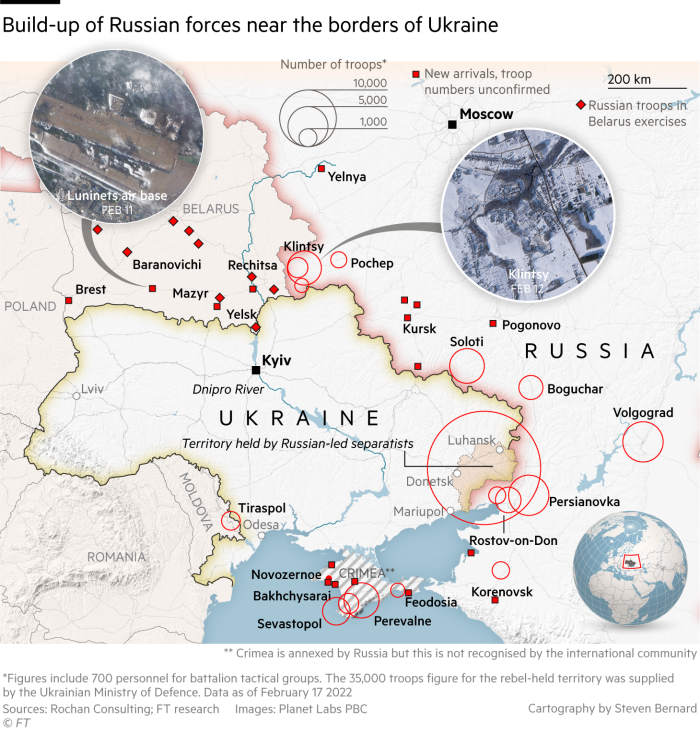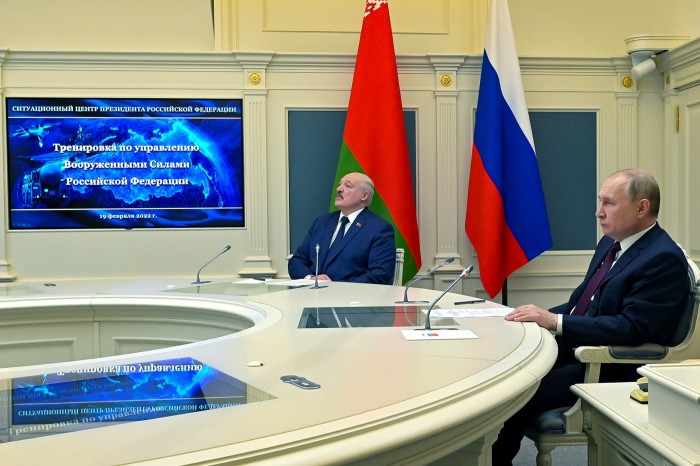Western leaders said Russia was following a “playbook of deception” to justify an invasion of Ukraine, amid intensifying clashes in the east of the country between Ukrainian forces and pro-Russian separatists.
Speaking at the Munich Security Conference, US vice-president Kamala Harris said Moscow was creating false pretexts for an attack while amassing troops and firepower in plain sight.
“We are seeing Russia spreading disinformation, lies and propaganda,” Harris told the annual get-together of politicians, diplomats and military officials, calling it “the playbook of Russian aggression”.
The White House said President Joe Biden would convene a meeting of his National Security Council Sunday to discuss the situation in Ukraine.
Ukrainian president Volodymyr Zelensky said Ukraine had fallen victim to an “information war, a hybrid war” but was “not responding to any provocations”.
“We know they’re firing from civilian areas, to provoke us, to make us respond,” he said. “We need to keep calm.”
The massive Russian troop build-up on the Ukrainian border has raised fears of a new war in the heart of Europe.
Western leaders speaking at the conference called for a diplomatic solution, urging Russia to “pull back from the brink”. But they also warned Moscow of the consequences of an invasion: far-reaching sanctions that they warned would inflict huge damage on its economy.
Zelensky used his appearance in Munich to appeal to the west to stand by Ukraine, and said western nations had let Kyiv down by appeasing Russia.
“Some countries are committing crimes while others are indifferent, and that indifference has turned them into accomplices,” he said.
Zelensky referred to a speech Vladimir Putin gave at the Munich conference in 2007 when he “threw down a challenge to the global security system”.
“How did the world respond? Appeasement,” he said. “What do we have as a result? The annexation of Crimea and aggression against my country.”
Speaking to CNN on the sidelines of the Munich conference on Saturday, Zelensky suggested Kyiv had a “different vision” than the west about when to apply sanctions. While the US and allies want to impose them after an attack as a punitive measure, Zelensky said they should be imposed immediately, particularly since an attack seemed close.
“We don’t need your sanctions after the bombardment will happen and after our country will be fired at or after we will have no borders, or after we will have no economy . . . why would we need those sanctions then?”
In a statement on Saturday, the G7 foreign ministers said: “While we are ready to explore diplomatic solutions to address legitimate security concerns, Russia should be in no doubt that any further military aggression against Ukraine will have massive consequences, including financial and economic sanctions on a wide array of sectoral and individual targets that would impose severe and unprecedented costs on the Russian economy. We will take co-ordinated restrictive measures in case of such an event.”
Ukrainian joint forces commander, Oleksander Pavlyuk said the situation around Donetsk and Luhansk had deteriorated over the past three days.
“If we take into consideration the past three months there were 3-5 ceasefire violations per day. Compared to that number, on Feb 17 we had 60 incidents of ceasefire violations by the Russian Federation Forces and 43 incidents of weapons banned by the Minsk agreements,” Lt Gen Pavlyuk said.
Ukraine said two soldiers were killed and four injured during shelling in the eastern border region of Donbas, where more than 14,000 have died in a slow-burning war that broke out after Russia annexed Crimea in 2014.
Ukrainian military officials and lawmakers touring frontline areas were forced to evacuate after coming under artillery fire.


Russian-backed separatist leaders in Donbas accused Kyiv of carrying out “terror attacks” that they said, without providing evidence, left unspecified numbers dead and wounded.
Russia said Ukrainian artillery fire had landed on the Russian side of the border. Zelensky dismissed the reports as “lies”.
The separatist leaders announced a mass evacuation of civilians to Russia — where Putin promised them a payment of Rbs100,000 — and called on all fighting-age men to mobilise.
Timecodes on the separatists’ video appeals were dated Wednesday — before the uptick in shelling began — adding to suspicions of a false flag operation as a pretext to invade.
British prime minister Boris Johnson said the world needed to prepare for “Russian playbook of deception” adding Moscow was “spinning a web of falsehoods designed to present any Russian attack as a response to provocation”.
Germany and France urged their citizens to leave Ukraine. They had previously refrained from calls to evacuate made by countries including the US and the UK.
Lufthansa, which owns airlines including Lufthansa, Austrian and Swiss, said it would stop regular flights to Kyiv and Odesa until the end of February. KLM and Norwegian have also cancelled flights to Ukraine.
Exacerbating the tensions, Russia began strategic nuclear exercises on Saturday.
Harris warned the west would impose “far-reaching financial sanctions and export controls” against Moscow should Putin give the order to attack Ukraine.
“Make no mistake, the imposition of these sweeping and co-ordinated measures will inflict great damage on those who must be held accountable,” she said.
Johnson said in the event of an invasion the west would “sanction Russian individuals and companies of strategic importance to the Russian state”.
“We will make it impossible for them to raise finance on the London capital markets,” he told the conference. “We will open up the matryoshka dolls of Russian-owned companies and Russian-owned entities to find the ultimate beneficiaries within.”
Other leaders appealed to Russia to step back from the brink.
Olaf Scholz, the German chancellor, said Russia’s attempt to turn Kyiv’s possible membership of Nato into a “casus belli” was a “paradox” because the issue was not on the west’s agenda.
Additional reporting by Philip Georgiadis and Jasmine Cameron-Chileshe in London, and James Politi in Washington.
Credit: Source link
















